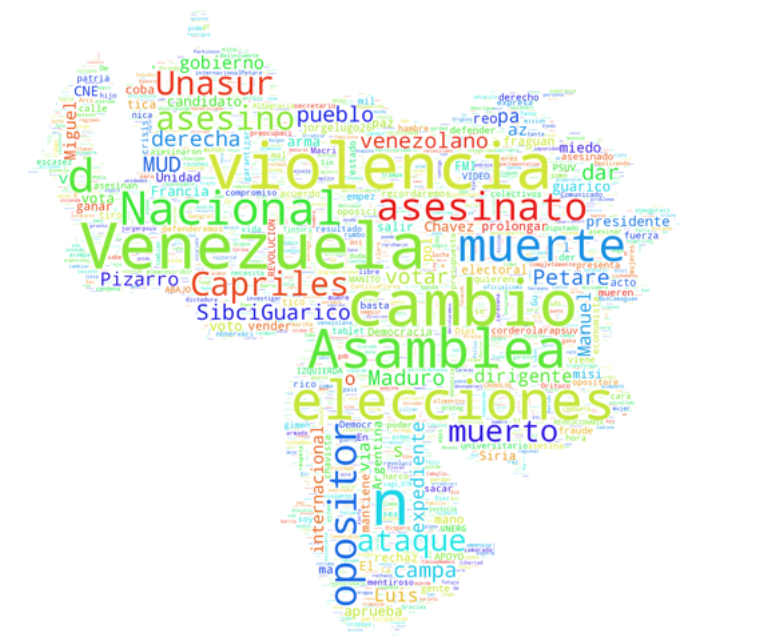A world cloud of tweets from Saturday, November 21 to Thursday November 26 show the terms dominating Venezuelan social media. The more times a word is mentioned, the bigger it is.
The killing of an opposition party leader in the state of Guárico last Wednesday raises concern Venezuela could see an increase in violence ahead of elections. It was the second case of armed violence at opposition campaign events in one week. On Sunday the 22nd opposition candidate Miguel Pizarro and a group of supporters were making their way through Petare and encountered a group of people with rifles shooting into the air.
Unfortunately, existing social scientific literature on electoral violence suggests these events might not be isolated.
The research has found that incumbents are more likely to use violence when they have a well-founded fear of losing elections (Bashin & Ghandhi, 2013; Hafner-Burton et al 2013). This violence is typically: aimed at opposition leaders rather than at the population as a whole; more likely to happen in the period right before the elections rather than much before or much earlier; more likely in close elections or when the incumbent is polling unfavourable; and carried out by a myriad of agents that range from military to paramilitary, to temporarily recruited youths (Bashin & Ghandhi, 2013; Hafner-Burton et al 2013).
Other research (Van Ham and Lindberg (2015)) argues that incumbent governments choose between different manipulation strategies that go from electoral violence to vote tampering. The choice of which of these strategies to use is dependent in part on the level of democracy of the country. In essence governments weight the costs and benefits of manipulation (Birch, 2011).
Venezuela is neither poor nor a nascent democracy, nor at particularly low levels of democratic development. In this type of setting the theory would predict that fraud and vote buying would be prevalent. But since the actual voting machines are difficult to tamper with and there is a significant gap in the polling between the government and opposition it would seem the costs of outright fraud are too high and as such electoral violence seems to be the way for confronting an unfavorable electoral situation.
Research points out that opposition challengers have reduced access to electoral manipulation and therefore only have violence as a tool to affect outcomes in a non-democratic way. When and how they use violence is related to levels of government intimidation (Van Ham and Lindberg (2015)).
Of course, while the Venezuelan government has responsibility for overall security, decentralized violence has characterized both sides of the political spectrum. While violent actions of pro-government ‘colectivos’ are the most well known manifestation of political violence in Venezuela, opposition-led “guarimbas” over the past ten years included significant violence and made it difficult if not impossible for people to circulate in some urban areas.
In recent weeks, President Maduro and government supporters have coined the phrase #SeaComoSea “whatever it takes” to peg their approach to the elections. On the opposition side some leaders are talking about a new Venezuela on the day after the election #PaseLoQuePase “no matter what happens.” These phrases certainly don’t help in ameliorating the tense situation ahead of the election.
With the absence of many of the traditional electoral observers (EU, OAS, Carter Center), and the rising tensions and increased probability that the government will not only loose but do so very badly, the chances for more electoral violence incidents are higher than in past elections. This is why at the University of Glasgow a research team on Explaining and Mitigating Electoral Violence has been following the situation in Venezuela by tracking Venezuelan social media.
At present the research team, comprised of political and computing scientists, is trying to determine the presence of reported incidents of electoral violence in twitter. As the word cloud at the beginning shows, the texts of the tweets can be a big indicative of events happening on the ground.
For a longer version of this post please visit here
Iñaki Sagarzazu is a Lecturer (Assistant Professor) in Politics at the University of Glasgow
Xiao Yang is a PhD student working for the project Explaining and Mitigating Electoral Violence



